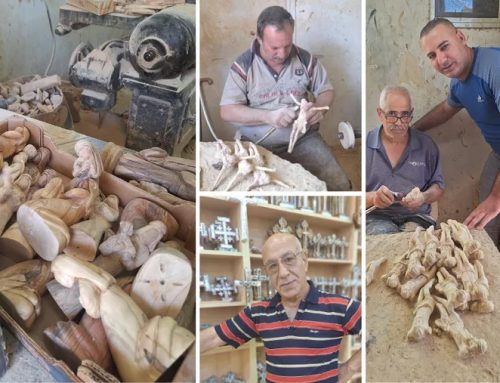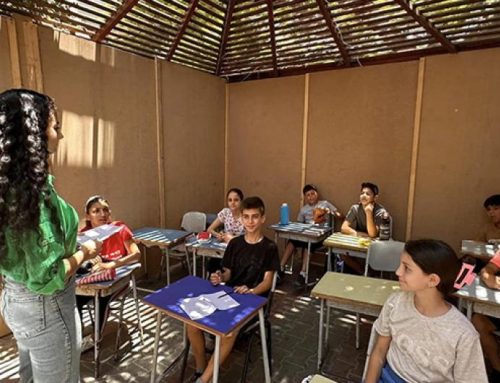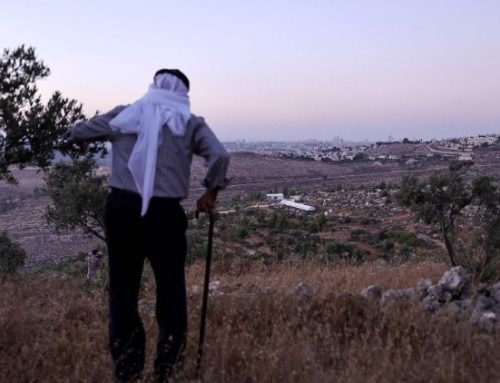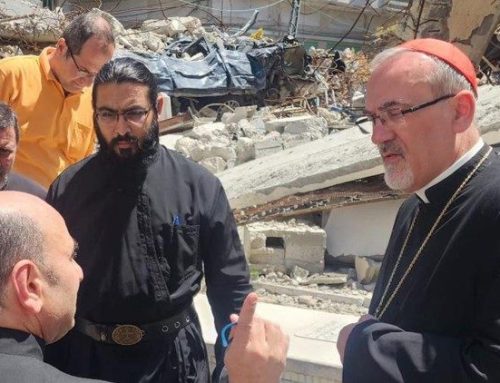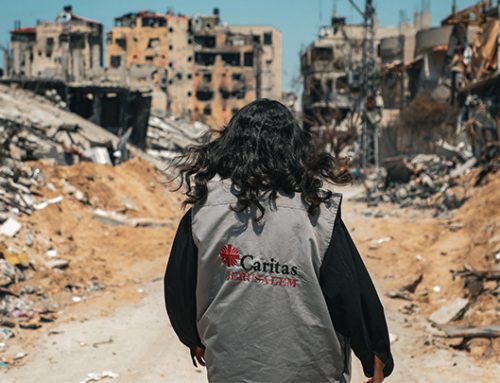Christmas 2019 – Midnight Mass Homily
Bethlehem, December 24, 2019
Dear Mr. President of the State of Palestine, Mahmoud Abbas,
Dear Mr. Musa Bek Al Daud, Representative of His Majesty King Abdullah II
Honorable Diplomats
Dear Brothers and Sisters in Christ,
May the Lord give you Peace!
My greetings to the faithful of our diocese of Jerusalem residing in Jordan, Israel, Palestine and Cyprus who, at this moment, are united with us in prayer or who are celebrating in their parishes, hospitals and wherever they are gathered to celebrate the Birth of Christ, in the family and in the community.
I greet the many pilgrims who wish to join the Church of Jerusalem to pray and celebrate with us this Christmas and, finally, I greet all those who are following us through television and the various media.
I wish that this Holy Christmas bring a little serenity to all of you.
The meaning of Christmas is always the same: Christ, the Son of God and God, our Savior and Lord, who becomes man and is born poor in Bethlehem. We celebrate the God who has always been in search of man, and who at Christmas decided to break into our own same flesh and live among us.
Faced with this great mystery, we are called every year to ask ourselves about its meaning for us, here and today, as if for the first time. Celebrating Christmas, in other words, means setting out once again, like the shepherds, like the Magi and like many believers of yesterday and today. For them, to celebrate the breaking-in of God among us meant to enter the life of the world, to take on the life and destiny of every man.
At Christmas, the whole world looks to us; all the believers turn to Bethlehem. Going to Bethlehem, however, does not only mean going to a place or celebrating a devotion. Rather it is to assume a style, the style of Jesus, that we could also call the “style of Bethlehem.”
This helps us to understand everything in the Gospel passage that was proclaimed tonight. It may seem strange that the Gospel passage telling the birth of the Savior (Lk 2:11) should have shepherds as the main actors. When an important person is born, all the important personalities are involved, not certainly the poor.
Jesus comes in such a way; His birth tells His style and His choices. He comes in a normal manner, without fuss, without advertising, without honors. True, the passage begins solemnly, citing the great events and the great figures of the time: Caesar Augustus (2:1), the governor of Syria, Quirinius (2:2), a census of the whole world. But these great events are suddenly left there. They have no sequel. These are not what changes history.
We could say, in this regard, that the passage is marked by two journeys or two movements. There is the journey of Mary and Joseph, and of those who, like them, go to be registered in the city where their families originated, in obedience to the decree of Caesar Augustus. And then there is the journey of the shepherds, who leave following an announcement unheard of before.
Mary and Joseph set off to submit to the whims of the powers that be, who want to measure their power and their riches. They leave, they arrive, they do what is commanded. But then everything returns as before.
The shepherds set off because they who count for nothing, are despised and marginalized, become the first recipients of a gift that is meant for everyone. Like the Easter Gospels, the characters of the Nativity story are described with verbs of motion.
God sets out and takes His first step among men. But this coming among us sets many others into motion. First, the angels who leave heaven to announce to men what is happening (Mt 2:9,14). Then the shepherds who leave their flocks to go and look for what was said to them (Mt 2:15). And later the Magi (Mt 2:1,11).
However, these journeys – the journeys of these insignificant persons at that time – change something. The Gospel uses an expression several times that can help us understand what is happening tonight. When the angel presented himself to the shepherds, it is said that “the glory of the Lord shone around them (enveloped them with light)” (Luke 2,9).
This is precisely the mystery of Christmas: God clothed Himself in our humanity to give back to us the clothing He had always planned for us – that of His glory, His own life. It is the clothing that man had lost when he went away from a relationship with God. By his disobedience, man was clothed in darkness.
The journey, the movement that begins this night, has as its goal the fullness of this exchange, of this new clothing. The rest of the Gospel is a continuation of this journey, which is a return of Christ from whence He came.
And the people of the Gospel are divided into two groups: those who set out with Christ and those who remain in their own way; those who welcome the announcement with surprise and those who do not move from their own security; those who agree, like the shepherds, to let themselves be clothed with light they did not merit, and those like Herod and the great ones of that time who remain closed in their palaces and in their empty certainties, who do not want to leave their mourning dress. Christmas must be sought. It cannot be encountered if we remain closed and frozen in our securities. We could say that Christmas is the day when we are called to ask ourselves once again where we stand: Are we with the shepherds on their journey, in search of Emmanuel, God-with-us, in our life and that of the world. Or are we locked inside our palaces?
I address this question first to myself and to our Church.
What does it mean for me, for us here today, to set off like the shepherds, and not to shut ourselves up in our palaces; to look for the mystery of Emmanuel and not to be afraid of the newness that is Jesus? What does it mean for us to be the people of Christ? What does it mean to assume the “style of Bethlehem”?
Even before being an action to realize, assuming the “style of Bethlehem” means embracing the destiny of every man as one’s own, within oneself, in one’s heart and in one’s flesh, beginning with the poor, those who are rejected and abandoned. It means, to lean over and tend to the wounds caused by injustice, hatred, and resentment. It means working in silence, without fuss, and without clamor, as happened with the birth of Jesus, to bring the light of the glory of God wherever there is a shadow of darkness. But first, it means allowing the light of Bethlehem to illuminate ourselves, our eyes and our heart. We cannot bring light unless we first receive it. And in order to let that light enlighten us, we must let the Child of Bethlehem overcome our inner resistance, our fears and conquer our hearts. The shepherds in the Gospel were free and immediately embraced the message of the angels. The poor of the Gospel have this freedom, which perhaps we lack. In this sense, here in the Holy Land, we have a long way to go before this style becomes truly ours.
Sometimes, I have the impression that we are guided more by our fears than by the light of God’s glory. I sense that the fear of making mistakes and of the judgment of this world determine our choices rather than the desire to meet every person, to love them and clothe them with light. I have the impression, at times, that we find it difficult to make the “style of Bethlehem” ours.
This happens when we become tired of seeing and recognizing what is happening around us as unjust; that is, when we resign ourselves to accept as normal the separations and divisions of our society caused by politics, or the effort in everyday life to find and go to work, to move freely; when we refuse to accept in our reality the existence of others different from us, be they Jewish, Muslim or Christian. It happens when we tire of talking about peace and building it, when we consider it an unattainable utopia. It happens, in short, when we remain closed in our palaces isolated from the life of the people, inside our homes and in our certainties, worried only about ourselves, and we refuse to listen, to welcome and make ours the voice of the humble, those different from us, those waiting for a word of hope. And I also think about the divisions in so many of our families – the violence and the bullying that seems to be the only language spoken by all.
It would be unfair, however, to limit ourselves to stigmatizing our effort to assume the “style of Bethlehem” and not to recognize instead those who live it in silence and with determination.
I think of those who spend their lives serving the disabled that nobody wants, the schools where our young Christians and Muslims grow up together, the many solidarity initiatives that continually arise within our communities throughout the territory of our diocese.
But I think we can also talk about the “style of Bethlehem” in this land of ours that is torn and divided by politics, religions and so much hatred, even when we meet people, associations, institutions that want, with determination and in spite of everything, to simply meet, to get to know each other, to build something together, to overcome the misunderstandings of those who do not share their desire for encounter and peace. They are the ones who, like the shepherds of Bethlehem, set out, by challenging fear, suspicion, and unbelief in order to meet and love Emmanuel, wherever and whoever he may be. Today they remind us that the “style of Bethlehem” is still possible. Celebrating Christmas, then, means celebrating those who still have a desire to love mankind and put themselves on the line for it.
Here in the Holy Land and not only today but every day of the year, there are still many people who celebrate the Christmas of Jesus in this way. And to them we extend our most sincere thanks and encouragement in continuing to be hope for all of us.
A child knows how to arouse tenderness and a smile in anyone, even in the hardest of hearts. That smile and that tenderness are part of the glory with which the angels enveloped the shepherds. May the Child of Bethlehem arouse much tenderness in all of us and make us smile once again! Even if all our problems are not solved, the Child will certainly make us cheerful.
Merry Christmas!
+Pierbattista
Source: Latin Patriarchate of Jerusalem


